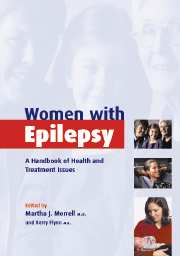Book contents
- Frontmatter
- Contents
- List of contributors
- Part I The woman with epilepsy
- Part II Epilepsy diagnosis and treatment
- Part III Hormones and the brain
- Part IV Health challenges for women with epilepsy
- Part V Family planning, pregnancy, and parenting
- Part VI Living well with epilepsy
- 23 The impact of epilepsy on relationships
- 24 Parenting the daughter with epilepsy
- 25 Safety issues for women with epilepsy
- 26 Legal issues facing women with epilepsy
- 27 Work issues and epilepsy
- Appendix: The Epilepsy Foundation's Campaign for Women's Health: bringing help and hope to women with epilepsy
- Index
24 - Parenting the daughter with epilepsy
from Part VI - Living well with epilepsy
Published online by Cambridge University Press: 02 November 2009
- Frontmatter
- Contents
- List of contributors
- Part I The woman with epilepsy
- Part II Epilepsy diagnosis and treatment
- Part III Hormones and the brain
- Part IV Health challenges for women with epilepsy
- Part V Family planning, pregnancy, and parenting
- Part VI Living well with epilepsy
- 23 The impact of epilepsy on relationships
- 24 Parenting the daughter with epilepsy
- 25 Safety issues for women with epilepsy
- 26 Legal issues facing women with epilepsy
- 27 Work issues and epilepsy
- Appendix: The Epilepsy Foundation's Campaign for Women's Health: bringing help and hope to women with epilepsy
- Index
Summary
Epilepsy affects every member of a family. A parent raising a young child with epilepsy has understandable concerns about the child's safety, but also understands that children need to run and climb, to ride a bike, and to swim. As the child grows, the parent decides about play dates, sleepovers, and summer camp. The adolescent wants to drive a car. Protecting and enhancing the child's emotional health are even more of a challenge. Ensuring healthy self-esteem is never easy, but when a child is dealing with a chronic illness, the difficulty is amplified.
Therefore, I felt it was important to include the perspective of a mother and daughter who had successfully dealt with epilepsy. I asked Janet Austin Tooze and her mother Joan Kessner Austin to share their personal experience – particularly how they had placed epilepsy in the proper perspective. I think you will find their story sincere, truthful, and moving. Although epilepsy is no longer part of their day-to-day life, it remains part of their family experience.
Dr Joan Kessner Austin has a PhD in nursing and her research has concerned the impact of chronic illness on the development of children with epilepsy and other chronic medical conditions. Her work has earned her a Javits Award from the National Institutes of Health as well as election to the Institute of Medicine. Janet Austin Tooze is now completing graduate work in statistics and is entering a health research career. Here is a story of how epilepsy affected, but did not define, one mother and daughter.[…]
- Type
- Chapter
- Information
- Women with EpilepsyA Handbook of Health and Treatment Issues, pp. 249 - 262Publisher: Cambridge University PressPrint publication year: 2003

